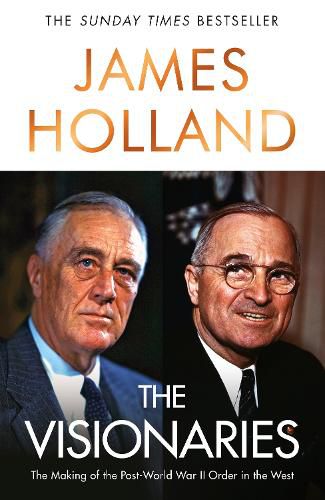Readings Newsletter
Become a Readings Member to make your shopping experience even easier.
Sign in or sign up for free!
You’re not far away from qualifying for FREE standard shipping within Australia
You’ve qualified for FREE standard shipping within Australia
The cart is loading…






A penetrating examination of the consequences of the Second World War which draws uncomfortable parallels with the world in which we live today.
'A gripping, behind-the-curtain story of the men and women who rebuilt the world after the carnage of World War II-and, in the process, engineered an age of unprecedented peace and prosperity. A must-read for anyone trying to understand how stability is built, how prosperity scales, and how we can protect what those architects created. Essential reading for anyone who cares about leadership and the future.' Anthony Scaramucci, former White House Communications Director
Although the Second World War was still a long way from being won, even by early 1941, US President Franklin Delano Roosevelt was already planning for peace. America's entry of the war may still have been almost a year away, but he could already see the new world order that needed to emerge from the smouldering ashes of Europe. The business of war was very quickly going to have to become the business of peace.
Three years later, under the guidance of his successor, President Harry S. Truman, the Marshall Plan would emerge, a forward-thinking combination of global philanthropy and canny self-interest, rooted in a profound sense of Christian and moral duty, and which kickstarted unprecedented European growth and a chance for the world as a whole to rebuild after the ruinous catastrophe of war.
From the world on the eve of war in 1914 through to the Versailles Treaty and the global financial catastrophe of the late 1920s and early thirties, and the political earthquakes that followed, The Visionaries takes a broad sweep of history with important lessons for today. It's a reminder that while history does not repeat itself, patterns of human behaviour certainly do.
James Holland's knowledge of the Second World War and its aftermath gives him unique insight into the far-reaching consequences of the financial policies of Roosevelt and Truman. The sustained period of economic stability they initiated delivered peace to the western democracies for over eighty years and stand in stark contrast to our transactional approach to the world today.
$9.00 standard shipping within Australia
FREE standard shipping within Australia for orders over $100.00
Express & International shipping calculated at checkout
Stock availability can be subject to change without notice. We recommend calling the shop or contacting our online team to check availability of low stock items. Please see our Shopping Online page for more details.
A penetrating examination of the consequences of the Second World War which draws uncomfortable parallels with the world in which we live today.
'A gripping, behind-the-curtain story of the men and women who rebuilt the world after the carnage of World War II-and, in the process, engineered an age of unprecedented peace and prosperity. A must-read for anyone trying to understand how stability is built, how prosperity scales, and how we can protect what those architects created. Essential reading for anyone who cares about leadership and the future.' Anthony Scaramucci, former White House Communications Director
Although the Second World War was still a long way from being won, even by early 1941, US President Franklin Delano Roosevelt was already planning for peace. America's entry of the war may still have been almost a year away, but he could already see the new world order that needed to emerge from the smouldering ashes of Europe. The business of war was very quickly going to have to become the business of peace.
Three years later, under the guidance of his successor, President Harry S. Truman, the Marshall Plan would emerge, a forward-thinking combination of global philanthropy and canny self-interest, rooted in a profound sense of Christian and moral duty, and which kickstarted unprecedented European growth and a chance for the world as a whole to rebuild after the ruinous catastrophe of war.
From the world on the eve of war in 1914 through to the Versailles Treaty and the global financial catastrophe of the late 1920s and early thirties, and the political earthquakes that followed, The Visionaries takes a broad sweep of history with important lessons for today. It's a reminder that while history does not repeat itself, patterns of human behaviour certainly do.
James Holland's knowledge of the Second World War and its aftermath gives him unique insight into the far-reaching consequences of the financial policies of Roosevelt and Truman. The sustained period of economic stability they initiated delivered peace to the western democracies for over eighty years and stand in stark contrast to our transactional approach to the world today.